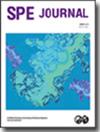Experimental Study on Permeability and Gas Production Characteristics of Montmorillonite Hydrate Sediments Considering the Effective Stress and Gas Slippage Effect
IF 3.2
3区 工程技术
Q1 ENGINEERING, PETROLEUM
引用次数: 0
Abstract
Gas permeability in hydrate reservoirs is the decisive parameter in determining the gas production efficiency and gas production of hydrate. In the South China Sea (SCS), the gas flow in tight natural gas hydrate (NGH) silty clay reservoirs is significantly affected by the gas slippage effect and the effective stress (ES) of overlying rock. To improve the effectiveness of hydrate exploitation, it is necessary to understand the influence of gas slippage in hydrate reservoirs on the permeability evolution law. For this paper, the gas permeability characteristics and methane production of hydrate montmorillonite sediments were studied at different pore pressures and ESs. Experimental data revealed that the gas permeability of montmorillonite samples before methane hydrate (MH) formation is seriously affected by the Klinkenberg effect. The gas permeability of montmorillonite sediments before hydrate formation is generally smaller than that after hydrate formation, and the gas slippage effect in the sediments after hydrate formation is weaker than that before hydrate formation. With the change in ES, the intrinsic permeability of sediment has a power law relationship with the simple ES. The ES law coefficient n was determined using the response surface method to eliminate the influence of gas slip on gas permeability. As pore pressure decreases and MH decomposes, montmorillonite swelling seriously affects gas permeability. However, the gas slippage effect has a good compensation effect on the permeability of montmorillonite sediments after MH decomposition under low pore pressure. The multistage depressurization-producing process of MH in montmorillonite sediments is mainly 3 MPa depressurization-producing stage and 2 MPa depressurization-producing stage. In this paper, the influence mechanism of gas slippage effect of hydrate reservoir is studied, which is conducive to improving the prediction accuracy of gas content in the process of hydrate exploitation and exploring the best pressure reduction method to increase the gas production of hydrate in the process of exploitation.考虑有效应力和气体滑动效应的蒙脱石水合物沉积物渗透性和产气特性试验研究
水合物储层的气体渗透率是决定水合物产气效率和产气量的决定性参数。在中国南海(SCS),致密天然气水合物(NGH)淤泥质粘土储层中的气流受天然气滑移效应和上覆岩石有效应力(ES)的显著影响。为了提高水合物开采的有效性,有必要了解水合物储层中气体滑移对渗透率演化规律的影响。本文研究了水合物蒙脱石沉积物在不同孔隙压力和 ES 条件下的气体渗透率特征和甲烷产量。实验数据表明,甲烷水合物(MH)形成前蒙脱土样品的气体渗透性受到克林肯贝格效应的严重影响。水合物形成前蒙脱石沉积物的气体渗透率一般小于水合物形成后的气体渗透率,水合物形成后沉积物中的气体滑移效应弱于水合物形成前的气体滑移效应。随着 ES 的变化,沉积物的内在渗透率与简单 ES 呈幂律关系。为消除气体滑移对气体渗透率的影响,采用响应面法确定了 ES 规律系数 n。随着孔隙压力的降低和 MH 的分解,蒙脱石膨胀会严重影响气体渗透率。然而,在低孔隙压力下,气体滑移效应对 MH 分解后蒙脱石沉积物的渗透性有很好的补偿作用。蒙脱石沉积物中 MH 的多级减压产气过程主要为 3 MPa 减压产气阶段和 2 MPa 减压产气阶段。本文研究了水合物储层滑气效应的影响机理,有利于提高水合物开采过程中含气预测精度,探索开采过程中提高水合物产气量的最佳减压方法。
本文章由计算机程序翻译,如有差异,请以英文原文为准。
求助全文
约1分钟内获得全文
求助全文
来源期刊

SPE Journal
工程技术-工程:石油
CiteScore
7.20
自引率
11.10%
发文量
229
审稿时长
4.5 months
期刊介绍:
Covers theories and emerging concepts spanning all aspects of engineering for oil and gas exploration and production, including reservoir characterization, multiphase flow, drilling dynamics, well architecture, gas well deliverability, numerical simulation, enhanced oil recovery, CO2 sequestration, and benchmarking and performance indicators.
 求助内容:
求助内容: 应助结果提醒方式:
应助结果提醒方式:


